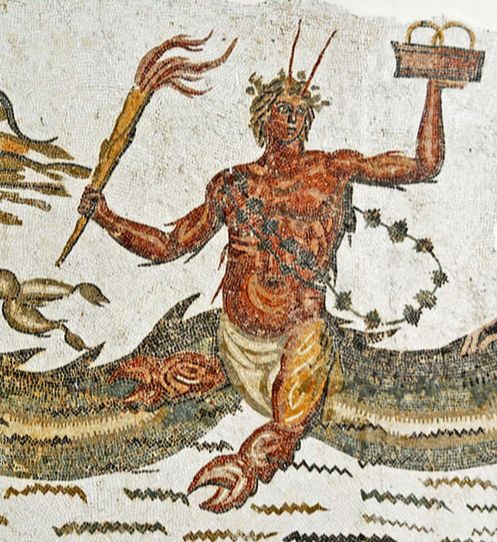THE SEA GOD PHORCYS IN GREEK MYTHOLOGY
Phorcys was an ancient sea god in Greek mythology; one of a number of strong deities to live and control in the dangerous open waters of Ancient Greece.
Phorcys Son of Gaia
Phorcys was considered to be the son of two Protogenoi, the first born gods of Greek mythology; these parents being Pontus (Sea) and Gaia (Earth). Phorcys was thus brother to other sea deities Eurybia (Mastery of the Seas), Nereus (Sea Wisdom) and Thaumas (Sea Wonders).
Surviving descriptions and depictions of Phorcys have the sea god as a grey-haired merman, with the common fish tail. Additionally though, Phorcys had many characteristics of a crab, with crab claws as supplementary forelegs, and the god’s skin was also crab like. Strangely enough, Phorcys was also normally depicted holding a flaming torch in one hand.
Phorcys’ home was a cave in the deepest part of the ocean, and he would reside there with his wife Ceto, who herself was the daughter of Pontus and Gaia.
Surviving descriptions and depictions of Phorcys have the sea god as a grey-haired merman, with the common fish tail. Additionally though, Phorcys had many characteristics of a crab, with crab claws as supplementary forelegs, and the god’s skin was also crab like. Strangely enough, Phorcys was also normally depicted holding a flaming torch in one hand.
Phorcys’ home was a cave in the deepest part of the ocean, and he would reside there with his wife Ceto, who herself was the daughter of Pontus and Gaia.
Phorcys God of Hidden Dangers
|
In the Homeric tradition, Phorcys is often regarded as the old man who ruled the seas, and indeed was sometimes called the “old man of the sea”. Phorcys though was just one of a number of sea deities, including the likes of Poseidon, Triton and Nereus, and in fact, it is more common to see Nereus named as the “Old Man of the Sea”.
Thus, rather than ruler of the sea, Phorcys became regarded as the Greek god of the hidden dangers of the seas, and the leader of the sea monsters that resided in it. |
|
To this end the children of Phorcys were personifications of things like hidden reefs, whilst his wife’s, Ceto, name means “sea monster”.
The Children of Phorcys
|
The fame of Phorcys in Greek mythology comes about through his role as father, for his children, collectively known as the Phorcides, are more famous than the sea god.
The Gorgons – Phorcys was father to the three Gorgons, Euralye, Stheno, and the extremely famous Medusa. The Gorgons were the personifications of reefs and underwater rocks that could wreck the boast of the uninformed sailor. Two of these daughters of Phorcys, Euralye and Etheno, were immortal, whilst of course Medusa was mortal and it was she who was hunted by Perseus. The Graeae – Phorcys was also father to another trio of sisters, these being the Graeae, the Grey Sisters, who were personifications of sea foam. These three sisters were Deino, Enyo and Pemphredo, and famously between them shared but one eye and one tooth. These daughters of Phorcys were also encountered by Perseus as he sought the secret location of the Gorgons. Echidna – Another daughter of Phorcys was Echidna, the monstrous dragon-serpent, who would become mother of the most famous monsters of Greek mythology, including the Chimera and Cerberus. Ladon – Another serpent-dragon was born to Phorcys and Ceto in the form of Ladon, or the Dragon of the Hesperides. Ladon was the guard for the Garden of Hera and the Golden Apples found inside it. |
|
Other Offspring of Phorcys
These children of Phorcys were generally agreed upon, but two additional children are also mentioned in some ancient sources.
Thoosa – Phorcys was also named by Homer as the father of Thoosa, the nymph, who by Poseidon, became mother of Polyphemus, the famous Cyclops.
Scylla – The monstrous Scylla was also named occasionally as a daughter of Phorcys. Commonly, Scylla was considered the daughter of Crataeis, although whether Crataeis was a nymph, another name for the goddess Hecate or another name for Ceto is not clear.
In the tale where Scylla is killed by Heracles, it was said that Phorcys brought his daughter back to life with his flaming torch.
Thoosa – Phorcys was also named by Homer as the father of Thoosa, the nymph, who by Poseidon, became mother of Polyphemus, the famous Cyclops.
Scylla – The monstrous Scylla was also named occasionally as a daughter of Phorcys. Commonly, Scylla was considered the daughter of Crataeis, although whether Crataeis was a nymph, another name for the goddess Hecate or another name for Ceto is not clear.
In the tale where Scylla is killed by Heracles, it was said that Phorcys brought his daughter back to life with his flaming torch.
|
|
